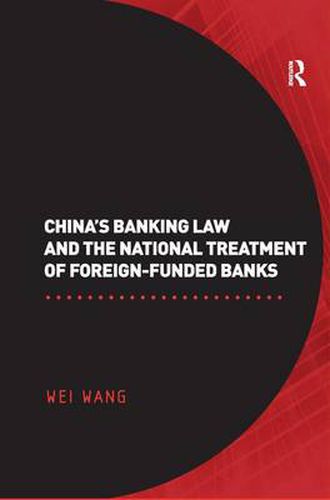Readings Newsletter
Become a Readings Member to make your shopping experience even easier.
Sign in or sign up for free!
You’re not far away from qualifying for FREE standard shipping within Australia
You’ve qualified for FREE standard shipping within Australia
The cart is loading…






This book assesses new developments in and reform of China’s banking law system following its accession of the WTO. It focuses on the relationship between GATS/WTO national treatment obligations and China’s banking law. Tracing the history of national treatment in China, the book compares the treatment of foreign-funded banks with the treatment of Chinese-funded banks and examines the structure and shortcomings of the existing banking law framework in China. Offering suggestions as to how the framework could be restructured and analysing the economic and political bases of an integrated banking law framework, the book argues that reorganization would bring about greater consistency with GATS/WTO national treatment requirements. The book also explores the ambiguous definition of prudential carve-out, the subtle relationship between GATS national treatment and market access based on WTO cases, national treatment clauses in China’s bilateral investment treaties, and special treatment on banking in China’s free trade agreements.
This volume is a valuable resource for academics and students as well as professionals and policy-makers working in the field of banking, WTO, Chinese law and foreign trade.
$9.00 standard shipping within Australia
FREE standard shipping within Australia for orders over $100.00
Express & International shipping calculated at checkout
This book assesses new developments in and reform of China’s banking law system following its accession of the WTO. It focuses on the relationship between GATS/WTO national treatment obligations and China’s banking law. Tracing the history of national treatment in China, the book compares the treatment of foreign-funded banks with the treatment of Chinese-funded banks and examines the structure and shortcomings of the existing banking law framework in China. Offering suggestions as to how the framework could be restructured and analysing the economic and political bases of an integrated banking law framework, the book argues that reorganization would bring about greater consistency with GATS/WTO national treatment requirements. The book also explores the ambiguous definition of prudential carve-out, the subtle relationship between GATS national treatment and market access based on WTO cases, national treatment clauses in China’s bilateral investment treaties, and special treatment on banking in China’s free trade agreements.
This volume is a valuable resource for academics and students as well as professionals and policy-makers working in the field of banking, WTO, Chinese law and foreign trade.